
The European market potential for desiccated coconut
Europe is the world’s largest importer of desiccated coconut. Desiccated coconut is a popular bakery and confectionery ingredient in Europe. The demand for desiccated coconut is driven by the growing popularity of Asian cuisine, a rising consumer interest in plant-based, gluten-free and keto diets, and the wide use of coconut in food products. Overall, the import of desiccated coconut to Europe has decreased slightly in recent years. The leading importers are the Netherlands, Germany, the United Kingdom, Poland, France and Belgium.
Contents of this page
1. Product description
Coconut is the sixth most cultivated fruit in the world. It can be found in 93 countries. Production covers an area of 12.3 million hectares, more than 70% of which is concentrated in just three countries. These are the Philippines (29%), Indonesia (25%) and India (17%).
The coconut is a special type of fruit called a drupe, which contains its seed within a hard shell contained within a fleshy or fibrous outer layer. Desiccated coconut is prepared from white kernel obtained from the mature coconut fruit (Cocos nucifera L.).
Desiccated coconut is an adaptable product widely used in the food industry. It is mainly used in the confectionery, bakery and ice cream sectors. It is coconut meat that has been chipped, grated, shredded or otherwise reduced to a particulate form and then dried to reduce the moisture content. It is used as an ingredient in many sweet bakery, pastry and chocolate products. Several brands of coconut chocolate bars with desiccated coconut are internationally famous, such as Bounty and Raffaello. It is also used in some savoury Asian dishes.
There are two primary types of palm trees that produce coconuts: the tall type (Cocos nucifera var. typica) and the dwarf type (Cocos nucifera var. nana). The tall type is the most common variety and is used for commercial coconut production. The specific variety of coconut used in the desiccated coconut production is often determined by regional availability and agricultural practices.
Figure 1: Desiccated coconuts manufacturing process

Source: Autentika Global, Coconut Developing Board India, 2023
Desiccated coconut processing can vary according to the country and processor, but a more detailed breakdown generally includes the operations described below.
- Selection of coconuts – the quality of desiccated coconut depends on the quality of the harvested fruit. It is produced from fully matured (10 to 13-month-old) coconuts. On average, the processing of 100 coconuts leads to around 10 kg of coconut powder.
- Harvesting – practices vary among regions. One method is to wait for ripened coconuts to fall and simply pick them off the ground. Other methods involve trained pickers who either climb the tree and pick nuts by hand or use a bamboo pole with a knife attached to the end. Mechanised harvesting and climbing devices are not used on a large scale. The use of trained monkeys is considered unethical.
- Mature coconuts are stored for about one month with the husk to absorb the water inside the kernels.
- De-husking – the husk is removed to make the coconut less bulky for transport. Often, the husk is removed manually by pushing the coconuts against a metal spike. Husks can also be removed by a pedal operated device or with a knife. De-husking machines are not widely used.
- De-shelling (also known as ‘hatcheting’) – the de-husked coconut is usually split into two halves with a machete. Before splitting, drilling is often used to collect coconut water. The coconut kernel is then removed from the shell with knife-like devices.
- Removing the testa (paring/peeling) – when the husk is removed, the kernel has a brown skin. In most cases, this brown skin (testa) is removed by hand. Peeling can also be performed on the whole nut, and cracking can be done after peeling. The brown skin can be kept to produce coconut pieces with brown edges (sometimes called smiles). However, for most desiccated coconuts, the skin is completely removed because the presence of paring specks is considered a defect.
- Washing and pasteurisation – the white kernels are washed and sterilised to remove microbiological contaminants. Pasteurisation depends on the installed processing lines and often includes soaking in sodium metabisulphite and heating. Other options are the use of boiling water or hot steam.
- Disintegrating – the pasteurised kernel is cut and shredded into small pieces on special machines. The size of the coconut pieces can be customised by adjusting the cutting equipment.
- Drying – the coconut pieces are air dried on trays until they reach the desired moisture level (usually around 3%).
- Sieving and packing – the dried coconut pieces are classified into different sizes using sieves, and then packed into bulk packaging.
After this process, the final product is ‘full fat’ desiccated coconut. This type of desiccated coconut has an oil content higher than 60%. Desiccated coconut can be also produced as a by-product of coconut milk, but this type has a lower fat content. Virgin coconut oil is produced by crushing desiccated coconut. Coconut flour is the by-product of this process.
Desiccated coconut is produced in almost all countries that grow coconuts. The biggest quantities are produced in South-East Asia, with the Philippines and Indonesia being the main processors. By-products like parings and shells are sold on the market.
This study covers general information on the European market for desiccated coconut that is of interest to producers in developing countries. For statistical trade analyses, the Harmonized System (HS) code 08011100 (‘Desiccated coconut’) is used. The term ‘Europe’ in this study refers to the 27 member states of the European Union (EU), plus the United Kingdom, and EFTA countries (Iceland, Liechtenstein, Norway and Switzerland).
Tip:
- Check out our study on coconut water in Europe to learn more about the European market potential for this product. Increasing your range of coconut products to include coconut milk, oil or water can increase your profit, sustainability and competitiveness.
2. What makes Europe an interesting market for desiccated coconut?
Europe is a large importing region of desiccated coconut. Imports arriving from outside Europe totalled 93,000 tonnes in 2022. Other large importers include the United States of America (54,000 tonnes), Singapore (32,000 tonnes) and China (24,000 tonnes). European imports of desiccated coconut are relatively stable. Since 2018, they have slightly decreased in quantity by 1% annually, but rose in value by 6% annually. The annual growth rate is expressed as the cumulative annual growth rate (CAGR).
European imports of desiccated coconut reached 121,000 tonnes in 2022, worth €325 million. However, a large part (23%) of traded quantities is internal European trade. Direct imports from coconut-producing countries amounted to 92,000 tonnes in 2022. The term developing countries in this report is used to denote countries that are listed on the OECD-DAC list of ODA recipients for 2022 and 2023 flows (PDF).
According to the FAO, worldwide coconut production increased to 64 million tonnes in 2021 after decreasing to 62.8 million tonnes in 2020. Desiccated coconut was available in April 2023, according to a leading trader in the commodity. The European market was oversupplied in 2022, as high interest rates and inflation lowered consumer demand.
Recent reports indicate that the market started moving up in 2023, as many parties started buying. Buyers are now worried about crop shortages, according to another leading trader. This could increase the demand and therefore prices.
In the next three years, the European market for desiccated coconut is likely to remain stagnant in terms of volume. Alternatively, it may become lower if inflation and recession remain ongoing. The annual growth rate is likely to be around 4% in terms of value. Volume imports might lose value if the high inflation rates seen in many European countries in 2023 are carried over into 2024. Imports fluxes will mostly depend on crop volumes and prices. Desiccated coconut manufacturing is very reliant on manpower and energy, and these costs are increasing.
In the longer term, the European market for desiccated coconut is expected to pick up pace. This is based on the popularity of the coconut flavour and on the expected economic growth in Central and Eastern European countries, especially if the war in Ukraine comes to an end. Desiccated coconut is a traditional baking and confectionery ingredient in many European countries. It is also used as an ingredient in savoury Asian dishes and gaining more attention thanks to growing consumer interest in Asian cooking.
Having low cholesterol and few calories, yet high in fat, desiccated coconut is increasingly consumed by those who pursue a low-calorie, high-fat diet or a ketogenic diet. With the rise of keto diets, desiccated coconut is now more than just a flavour ingredient, it has become an important weight loss food.
Source: Autentika Global, GTA, 2023
European imports from developing countries fell over the last 5 years, from 96,000 tonnes in 2018 to 92,000 tonnes in 2022. The annual rate of change of European desiccated coconut imports from developing countries in this period was -1% in volume and 6% in value.
The European market for desiccated coconut is moderately concentrated. Three countries account for more than 55% of total imports. The Netherlands was the leading importer in Europe (30%) in 2022, followed by Germany (15%), the United Kingdom (11%), Poland (7%), France (6%) and Belgium (5%).
Source: Autentika Global, GTA
The COVID-19 pandemic affected the European food market, including that of desiccated coconut. This mainly influenced the market structure. Sales through the food service segment (as an ingredient) decreased due to the closure of restaurants and hotels. On the other hand, retail sales and home delivery sales increased. With the end of COVID-19 restrictions in 2022, consumer behaviour returned to pre-pandemic normality.
Tip:
- Read CBI’s demand study for a broader view of the processed fruit and vegetables market in Europe.
3. Which European countries offer most opportunities for desiccated coconut?
The main importers of desiccated coconut in Europe are also the leading consumers: the Netherlands, Germany and the United Kingdom. Figure 3 represents apparent consumption. Apparent consumption is expressed as the difference between imports and exports. The data on apparent consumption does not provide direct insight into product stocks. Large stocks in big trading markets such as the Netherlands and Germany can influence imports. Most large Dutch and German traders regularly keep stocks of desiccated coconut to ensure a stable supply.
The consumption of desiccated coconut is less concentrated than the imports. The Netherlands, the United Kingdom and Germany together consume less than 50% of the total European consumption. This smaller share is different from the imports, where those three countries dominate the market. This means that large quantities are re-exported, particularly by the Netherlands and Germany.
Over the last 5 years, the highest consumption growth rate was noted in Poland, while the consumption rate in the United Kingdom and France was relatively stable. The Netherlands showed a large drop in apparent consumption in 2022, which probably reflects large inventories. The general trend in the period between 2018 and 2022 was towards decreasing consumption, although this was also partially influenced by the pandemic and the war in Ukraine.
Source: Autentika Global, GTA
The Netherlands: the largest importer and re-exporter of desiccated coconut
The Netherlands is Europe’s largest and the world’s second-largest importer of desiccated coconut. The country imports 36,000 tonnes of desiccated coconut, worth €97.7 million. This accounts for 46% of European imports. Over the last 5 years, the Dutch average annual import growth rate was 4% in volume and 11% in value. Dutch imports of desiccated coconut showed faster growth in 2021 and 2022, following a relatively stable period in 2018 to 2020. This was due to a sudden recovery in imports following the COVID-19 pandemic.
The Netherlands imports most of its desiccated coconut directly from producing countries (96%). In 2022, the leading supplying country to the Netherlands was the Philippines (80%), followed by Indonesia (12%), Sri Lanka (2%) and Malaysia (1%). Costa Rica recorded a very fast growth of desiccated coconut exports to the Netherlands imports, from 120 tonnes in 2018 to 739 tonnes in 2021. However, exports dropped to 80 tonnes in 2022.
In the next three years, Dutch desiccated coconut imports are likely to continue growing at an annual rate of 3‑4% in volume and 7-8% in value. Demand could be affected negatively if higher-than-usual European inflation rates persist. Unless there are major unexpected shifts in demand, imports will mostly depend on harvests and prices. Prospects for desiccated coconut exports to the Netherlands in the long term remain strong. Strong vegan trends and a rise in healthy eating habits are favourable factors for long-term exports to the Netherlands.
Source: Autentika Global, GTA
The Netherlands used to consume roughly half of its imported desiccated coconut, but over the past few years this share has been falling. Most imported desiccated coconut is re-exported. Thanks to the location of the largest European port and a long history of trade in coconut products, the Netherlands has positioned itself as a unique trade hub for coconut products. It is home to some of the largest desiccated coconut companies in Europe, such as Acomo Group and its specialised coconut trading house Catz International.
The Netherlands is also a significant consumer of desiccated coconut. The Netherlands has a strong confectionery and bakery industry that uses desiccated coconut for baked goods, sweets and chocolates. For example, ‘kokosbrood’ (coconut bread) is a popular Dutch treat that prominently features coconut. A large consumer of desiccated coconut is the Mars factory located in Veghel, which produces Bounty coconut chocolate bars. Indonesian and Caribbean dishes that use desiccated coconut as an ingredient are popular in the Netherlands because of the its colonial history.
In the Netherlands, there is reliable demand for sustainably produced ingredients. The Free From Food Expo regional show, which is a show for products with special certifications, will take place in November 2023 in Amsterdam. The event promotes vegan, plant-based, organic, functional and healthy lifestyle foods. Products made from desiccated coconut fit into these groups, depending on production and processing methods.
For home consumption, desiccated coconut in the Netherlands is packed under private labels of the leading retail chains, such as Albert Heijn (AH and AH Bio labels), Jumbo (Jumbo Label), Lidl (Belbake label), Superunie (several supermarkets with private label Sum & Sam) and others. Independent brands include packing companies, organic food traders, importers and ethnic food suppliers such as Smaakt (organic), Theha (also an importer and processor), Damhert (a Belgian functional, healthy food brand) and Conimex (Indonesian and Asian products).
Tip:
- For more information on Dutch desiccated coconut traders, contact the Dutch trade association for dried fruit, nuts, spices and related products. Alternatively, you can search through the member list of the Dutch Spice Association, as several spices and herbs traders also trade in desiccated coconut.
Figure 6: Coconut bread
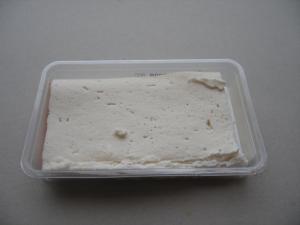
Source: Kokosbrood by Basvb is licensed under CC BY-SA 3.0
Figure 7: Bounty coconut chocolate bar (by Mars) produced in the Netherlands
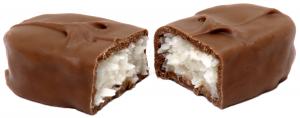
Source: Bounty-Split, by Evan-Amos, Licence Public Domain
Germany: the second-largest European importer
In 2022, Germany imported 18,000 tonnes of desiccated coconut, worth €48 million. At the same time, it re- exported 7,600 tonnes of desiccated coconut, leaving 10,600 tonnes for domestic consumption. German imports peaked at more than 25,000 tonnes in 2021, then dropped in 2022. Over the past 5 years, the value of German imports increased by 5.5% annually, although volumes fell by 1.6% annually in the same period.
Germany’s market should see value growth at around 3-4% annually, while volumes are likely to rise again. However, high inflation seen across Europe in 2022-2023 could see German consumers switching to more affordable dried fruits. If the price of desiccated coconut increases, some consumers and food processors might switch to other coconut products such as coconut flour or coconut milk, which can sometimes be used as alternatives depending on the specific application.
Prospects for desiccated coconut exports to Germany in the long term (2026 and beyond) remain strong. Younger consumers are at the forefront of vegan trends, healthy nutrition and healthy snacking, all of which benefit consumption. Furthermore, desiccated coconut does not have a direct competition in terms of flavour. Given the rising trend of healthy eating and veganism, desiccated coconut is often found in health foods like smoothies and vegan dairy substitutes.
When it comes to desiccated coconut imports in 2022, Germany sourced 42% of these imports from Indonesia and 31% from the Philippines. Other notable suppliers were the Netherlands (14%) and Sri Lanka (7%). Among developing countries, Ghana has been gaining German market share at a fast rate. Ghana increased its exports to Germany from 46 tonnes in 2018 to 160 tonnes in 2022.
Desiccated coconut is often used in biscuits, cakes and pastries. For example, ‘Kokosmakronen’ are traditional German coconut macaroons, and ‘Lamingtons’ are small cakes coated in chocolate and desiccated coconut that are popular in Germany. Desiccated coconut is also used in savoury dishes, such as coconut rice, adding a unique flavour and texture. Many German confectionary and chocolates use desiccated coconut.
Figure 8: Fine shredded coconut obtained from desiccated coconut, sold by Lidl
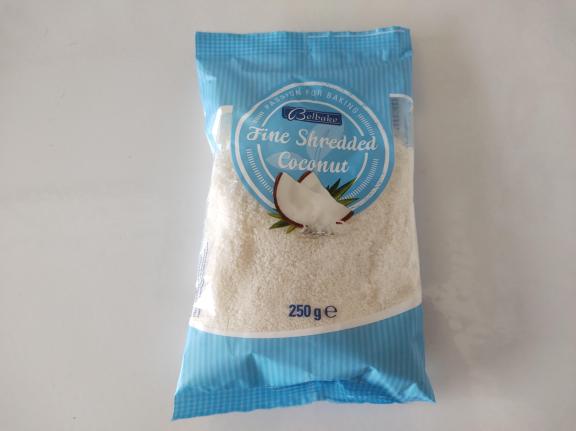
Source: Autentika Global
Germany is a particularly attractive market for organic desiccated coconut, as the country is the largest European market for organic food consumption. The German organic food market increased by 5.8% in 2021 and reached a value of €15.8 billion. A large share of organic desiccated coconut for home consumption is sold under the private label brands of specialised organic retailers, such as Bio Markt, DM and Alnatura. There are also independent organic brands, such as Rapunzel, Clasen Bio and Morgenland.
Organic desiccated coconut in Germany is also used as an ingredient in a large variety of products. Some examples are fruit and protein bars (such as mogli, Alnatura or Veganz), breakfast cereals (such as DM, Alnatura, Biozentrale or Seitenbacher) and curry sauces (such as Biozentrale and Rapunzel). Dr. Goerg sells a range of premium raw organic desiccated coconut products.
As a commodity product, desiccated coconut is used as an ingredient in a variety of foods, such as biscuits, ice cream, chocolate bars, cakes and pastries. For home consumption, desiccated coconut is sold in large quantities under private labels, including Belbake (by discounter chain Lidl), K Classic (by Kaufland), Back Family (by Aldi Süd and Aldi Nord), ja! (by REWE), Edeka and Ediba Bio (by Edeka). Examples of independent brands are Seeberger, KoRo and Dr. Goerg.
Figure 9: Organic and vegan chocolate coated coconut bar sold by DM
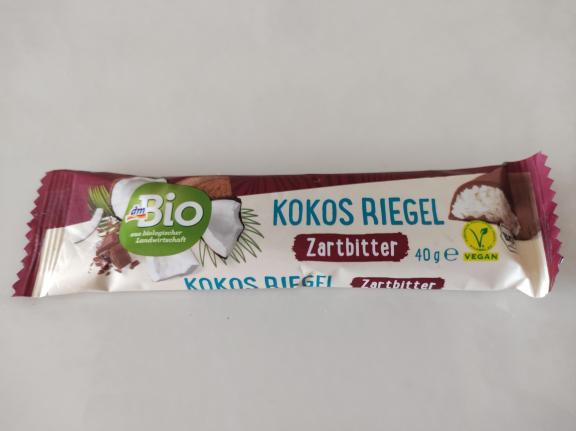
Source: Autentika Global
Tip:
- Search for German desiccated coconut traders on the websites of the specialised trade promotion organisation Waren-Verein der Hamburger Börse and the German B2B platform Wer liefert was (wlw).
The United Kingdom: Huge domestic consumption
The United Kingdom’s desiccated coconut import volume in 2022 was 15,600 tonnes, worth €36.2 million. This is less than half of the Dutch import volume in terms of value and volume. On average, the United Kingdom’s imports decreased by 3% annually between 2018 and 2022. This coincided with the unstable supply due to the COVID-19 pandemic and the high inflation post-pandemic. A specific characteristic of the British desiccated coconut market is that most of the imported quantities are consumed within the country. Around 500 tonnes were re-exported to other countries in 2022.
The United Kingdom imports one third of its desiccated coconut from the Philippines, followed by Indonesia (21%), Malaysia (19%) and Sri Lanka (12%). The United Kingdom is the main European market for Malaysian desiccated coconut. Sri Lanka has been gaining market share in the British market rapidly. Sri Lankan desiccated coconut exports increased from 363 tonnes in 2018 to 1,603 tonnes in 2022.
The United Kingdom’s desiccated coconuts imports fell by 2.9% in volume and by 4.1% in value between 2018 and 2022. This drop in value in this period reflects a trend of higher prices that suppressed demand. Short-term sales prospects may be affected by high inflation. In May 2023, the Bank of England forecast inflation would stay higher for longer than previously expected. The United Kingdom’s inflation rate in 2023 was the highest in the G7. The market could continue falling or may stagnate in the next few years.
Longer-term (2026 and beyond) prospects for exports to the United Kingdom remain strong, as the population is projected to grow and become more diverse. Desiccated coconut is perceived as a health food due to its high fibre content, medium-chain fatty acids and other nutrients. Desiccated coconut is a popular ingredient in vegan and plant-based cooking because it can be used as a dairy substitute and provides a unique flavour and texture. The United Kingdom has a robust confectionery and baking industry that use desiccated coconut.
Around 40 companies participate in the direct import of desiccated coconut, but the largest share is imported by a few large traders. First Grade International is a major importer of coconut and coconut ingredients, including desiccated coconut, in the United Kingdom. Other importers include Chelmer Foods, CG Hacking and Sons and TM Duché & Sons. A significant share of imported desiccated coconut is also traded by companies specialised in Asian food. Some ethnic food traders have developed their own popular brands, such as East End Foods and Alamgeer.
As desiccated coconut is mostly a commodity ingredient, consumers are not very familiar with the quality characteristics and desiccated coconut brands. The retail market is largely dominated by private labels of retail chains, such as Tesco, Sainsbury’s, ASDA, Morrisons and others. Some of the established independent brands are Whitworths, Coconut Merchant and Crazy Jack. Keep in mind that many packagers in the United Kingdom do not import directly but buy desiccated coconut from specialised importers. This is also true for established brands.
Fairtrade-certified desiccated coconut can offer opportunities for new suppliers, as the United Kingdom is the largest Fairtrade market in Europe. However, the number of direct importers is small. Currently, it only includes a couple of companies, such as First Grade International. An important British seller of organic desiccated coconut as an ingredient for the food industry is Just Ingredients.
Tip:
- Find British importers of desiccated coconut through the National Dried Fruit Trade Association UK member list.
Poland: a stagnating market and lower imports from developing countries
Poland’s imports of desiccated coconut have fallen over the last 5 years. Polish imports decreased at an average annual rate of 3%, reaching 8,500 tonnes in 2022. Polish desiccated coconut imports increased in value by 9.3% to €25.2 million in 2022. Most of the imported quantities are consumed within the country. Small quantities are re-exported mostly to the Czech Republic and Ukraine. Re-exports fell from more than 2,000 tonnes in 2018 to below 450 tonnes in 2022. The estimated consumption in Poland was 8,000 tonnes in 2022.
There has been a major shift in imports to Poland in the past 5 years. While developing countries supplied 58% of imported volumes in 2018, this dropped to 37% in 2022. Belgium emerged as the country’s largest supplier in 2022, followed by Indonesia (30%), the Netherlands (8%) and Germany (5%). The Philippines increased its exports to Poland from 138 tonnes in 2018 to 324 tonnes in 2022.
Figure 10: Polish coconut-flavoured desert ‘ciastka kokosowe’
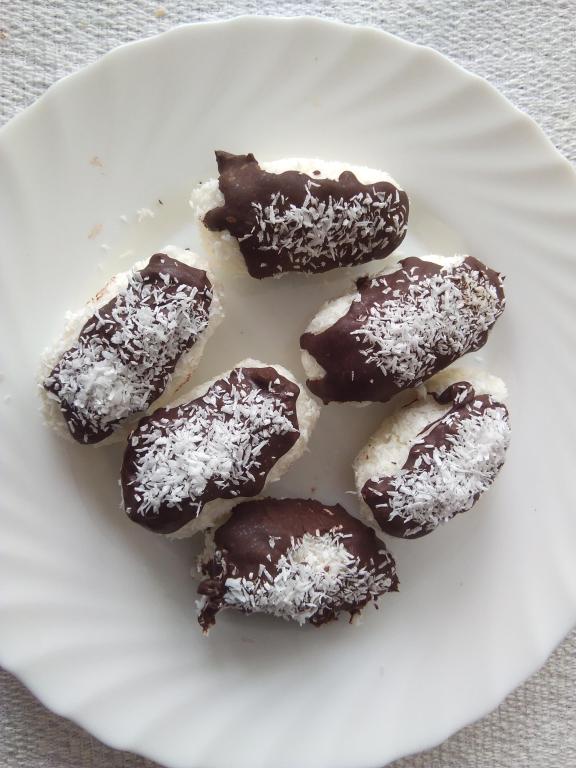
Source: ‘Ciastka Kokosowe - maj 2019.jpg’ by Koefbac is licensed under CC BY-SA 4.0
In Poland, desiccated coconut is mainly used as an ingredient for the processing industry. It is mainly used to produce sweet foods. There are several packing companies offering desiccated coconut for home consumption, either as a private label or own brand. Desiccated coconuts are used to manufacture ‘ciastka kokosowe’, coconut-flavoured biscuits, and the traditional Polish desert ‘kokosanki’. Mondelēz International produces its San desiccated coconut-based biscuits at its Polish plant Mondelez Polska in Jarosław.
The market share of desiccated coconut sold under private labels in Poland is estimated to be more than 50%. It is led by retail chain Biedronka and followed by Lidl, Tesco, ABC, Kaufland and others. Some of the independent brands include Bakalland, Kresto (by Vog), KruKam, Targroch and Bioplanet (organic).
Figure 11: Crunchy swirl biscuits with desiccated coconut made by Mondelēz International in Poland
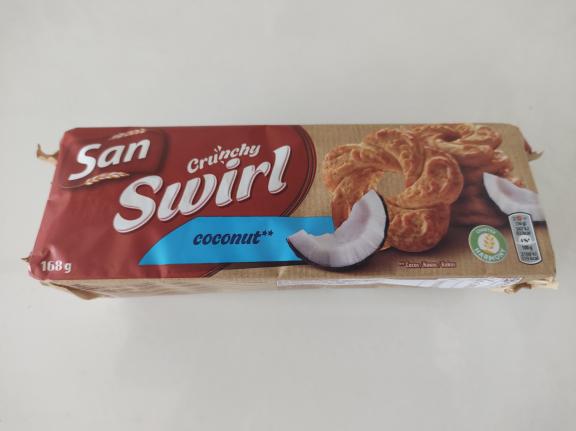
Source: Autentika Global
The Polish economy has been negatively affected by the war in Ukraine. Economic growth in Poland is likely to fall to 0.7% in 2023 due to high inflation, monetary policy tightening and the ongoing fallout from Russia’s invasion of Ukraine. In 2024, the country’s growth is expected to strengthen to 2.6%, according to the World Bank. Long-term prospects are strong, as Poland has a significant food processing industry, and the country has seen a growing trend toward healthier eating.
Tips:
- For information on Polish companies, contact the Polish Chamber of Commerce.
- Consult experts from the Polish RoślinnieJemy group that promotes sales of plant-based food products.
France: the home of European bakery and pastry excellence
France is the fifth-largest importer and consumer of desiccated coconut in Europe. Over the past 5 years, French imports decreased by 5.3% in quantity and increased by 0.6% in value on average. This is due to higher prices and inflation. Although consumption of desiccated coconuts contracted between 2018 and 2022, higher commodity prices led to a higher overall value of imports. During the pandemic, some French traders decided to import desiccated coconut through Dutch and German importers rather than directly from producing countries due to unstable supplies.
The leading supplier of coconuts to France is the Philippines (35%) import share, followed by Indonesia (22%) and Sri Lanka (11%). Since a further 19% of imports comes from the Netherlands and Germany, the share of desiccated coconut from main origins is estimated to be higher. One of the German suppliers is Berlin-based natural food company KoRo. Emerging suppliers from Benin and Sierra Leone are increasing their exports to France too, while Vietnam has an annual export that fluctuates between 100 and 400 tonnes.
In France, most desiccated coconut is used by the bakery and confectionary industry. The French bakery and pastry industry is one of the most developed in Europe, with several associations. Desiccated coconut is widely used in a variety of desserts, such as ‘Rochers à la noix de coco’ (Rochers coco), or coconut rocks), French coconut pie, coconut cake and many others. Some of the largest bakery and pastry companies import desiccated coconut directly, but most of them are supplied through importers and wholesalers.
Figure 12: ‘Rochers coco’ with chocolate (coconut rocks with chocolate)
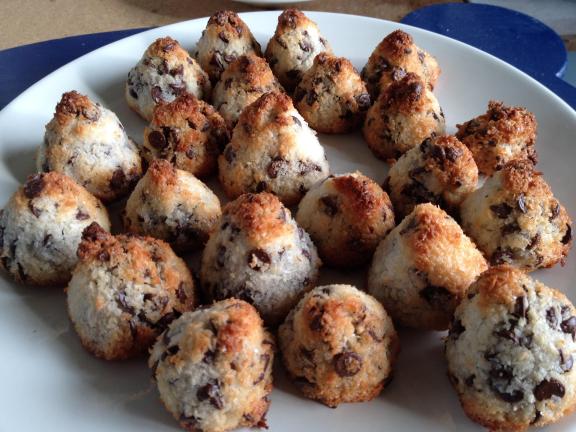
Source: ‘Rochers coco chocolat’ by joellehellenique is licensed under CC BY-SA 2.0
Desiccated coconut for home consumption is sold through the re-packing activities of many suppliers. An important domestic trader and supplier is Bedouin Fruit Sec. Most of the market share for packed products is held by leading retail chains, such as Carrefour (Carrefour, Carrefour Bio and Petit Prix labels), Leclerc (Tablier Blanc label), Super U (U label), Intermarché (Chabrior label) and Auchan (Auchan label). Independent brands include Vahiné, La Patelière, Sainte Lucie and Maître Prunille.
Tips:
- Visit the websites of the French Federation of Bakery Companies and the National Union of Manufacturers of Intermediate Products for Bakeries and Pastries (both only in French) to find users of desiccated coconut in the French bakery and pastry industry.
- If you are not from a French-speaking country, consider investing in French-speaking staff to facilitate entry to the French market.
Belgium: large sweets producing industry
Belgium is a heavy industrial user of desiccated coconut, despite having a smaller population than other top European markets. Belgian imports fell relatively sharply over the past 5 years. In 2022, the volume of imports fell at an average annual rate of 8% to 5,800 tonnes. In terms of value, imports fell at an average annual rate of 2.0% to €18.2 million in 2022.
Belgium imported most of its desiccated coconut from the Netherlands (69%) in 2022, followed by the Philippines (21%), Indonesia (4%) and Sri Lanka (2%). One of the reasons for the large share of import from the Netherlands is the good trade relations and the proximity of the two countries.
Desiccated coconut is used in various ways, both in the French-speaking and Flemish-speaking regions. It is used as an ingredient in both sweet and savoury dishes. Belgium is home to several large-scale producers of confectionery products and pastries that use desiccated coconut as an ingredient.
Belgium is the home of the largest chocolate factory in the world: Barry Callebaut with a factory in Wieze. Italian group Ferrero manufactures its round desiccated coconut–almond truffle Raffaello in the Belgian city of Arlon. Belgian chocolate company Vital makes popular coconut bars covered with milk and dark chocolate.
Figure 13: Raffaello (by Ferrero), desiccated coconut praline, produced in Belgium
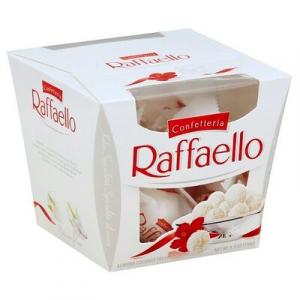
Source: Photo by org-ferrero-france-commerciale, for Open Food Facts (licensed under the Creative Commons Attribution-Share Alike 3.0 license)
Retail sales of desiccated coconut in Belgium are led by the private labels of supermarket chains Colruyt and Delhaize. The market share of independent brands is small. Examples include Vahine and Smaakt. An example of Belgian traders and wholesalers is Allnuts.
Figure 14: Private label mini rochers biscuits with desiccated coconut

Source: Autentika Global
Tip:
- Find users of desiccated coconut in Belgium among the 170 members of the Royal Belgian Association of the Chocolate, Pralines, Biscuit and Confectionary (Choprabisco).
4. Which trends offer opportunities or pose threats on the European desiccated coconut market?
The COVID-19 pandemic led to an increase in the consumption of sweet snacks at home. Consumers continue to look for healthier and plant-based foods, which has had a positive effect on the consumption of natural coconut snacks. After the pandemic restrictions ended, high food inflation and high commodity prices reduced the purchasing power of European consumers. Consumers are buying more essential food products, which could be a threat for the demand for desiccated coconut in Europe.
Below is a summary of the trends for desiccated coconut specifically. To find out more about general trends, read our study on trends in the European processed fruit and vegetables market.
Europe’s food inflation and Ukraine war as a threat
Overall, demand for desiccated coconut remains strong in various regions of the world. The Philippines and Indonesia, two of the world's major producers and exporters, have seen an upward trend in their exports of desiccated coconut from 2019 to 2022. However, European imports from developing countries fell over the last 5 years, from 96,000 tonnes in 2018 to 92,000 tonnes in 2022.
Imports of desiccated coconut by EU-27 countries dropped by 7.8% during 2022, while US imports continued to rise by 1.5%. The causes of this drop in Europe include lower demand due to supply chain disruptions, high food inflation in the post-pandemic period and the Russian invasion of Ukraine in 2022. There has been a clear weakening of prices of desiccated coconut throughout 2022, probably because of high and persistent inflation across Europe and the United States, which reduced consumer purchasing power and demand.
The annual inflation rate in the European Union measured 7.1% (PDF) in May 2023, down from 8.1% in April. A year earlier, this rate was 8.8%. However, the highest contribution to the annual inflation rate came from food, alcohol and tobacco. The inflation in the food segment was twice as high as the average inflation rate, which indicates there is significant pressure on consumer spending.
In May 2023, the Bank of England warned that inflation in the United Kingdom is too high, at around 10% since the summer of 2022. It led to a big rise in the price of gas and some food basics like wheat. Although the Bank of England said it expects inflation to fall to around 5% by the end of this year, it added that the prices of food will keep rising. “Food price inflation is likely to fall back more slowly than previously expected,” it said in May 2023.
Exporters of desiccated coconut to Europe should be aware that the threat of inflation in is still a significant factor that affects consumer behaviour.
Tips:
- Monitor major economic data in the UK, EU and EFTA countries. High inflation, especially in the food sector, will probably lead to lower consumer purchases and a shift in consumer patterns. Check out Eurostat’s free monthly inflation reports.
- If you are interested in the latest economic data for the UK, consult the Bank of England’s monthly monetary policy reports and inflation attitudes surveys. Both are available for free from the bank’s publications web page.
- Keep an eye on events in the ongoing war in Ukraine that is now (2023) in its second year. Food inflation has been affected by wider developments in global agricultural commodity prices, which also reflect Russia’s invasion of Ukraine and wider pressures throughout the supply chain.
Sourcing of sustainably produced coconut products
The global coconut industry has improved significantly in recent years, yet it is facing substantial issues related to sustainability that have not yet been resolved. These issues include factors like the amount of old coconut trees, the aftermath of natural disasters, and a lack of financial, farming and technical knowledge among growers. These issues become visible in the form of low-quality produce, low earnings for growers and a lack of motivation to upgrade methods.
Improving sustainability when importing to European markets is important, as Europe is increasingly focused on the sustainable production of food and other products. The European Union has implemented a set of policies and actions called the European Green Deal (PDF). The aim of this Green Deal is to make the European economy more sustainable and climate neutral by 2050. The action plan also includes a Farm to Fork Strategy aimed at making food systems fairer and more environmentally friendly.
To encourage companies to take better care of human rights and the environmental impact in their supply chains, the European Union announced legislation on due diligence in March 2021. To comply with this objective, several European companies have launched their own support projects in coconut-producing countries. A notable example is the Catz Charity Foundation, founded by Catz International.
A number of factors, especially low farmer incomes, pose a threat to the sustainability of the desiccated coconut production. However, desiccated coconut producers also have opportunities to make their produce more sustainable. This may provide a new competitive edge for exporters of desiccated coconuts. Some of the key challenges the industry faces include:
- Fragmented supply chains – This phenomenon increases the challenge of implementing functional traceability solutions and complicates direct engagement with farmers.
- Vulnerable livelihoods of smallholder farmers – Coconut growers find themselves in economic danger because of several factors. These factors include aging trees, small incomes, no access to market news and climate change. Low-income production also creates a risk of child labour. Over 50% of the Pacific’s 1.3 million coconut trees (PDF) are estimated to be ‘senile’ or ‘unproductive’.
- Low productivity – Growers may have limited knowledge regarding the best farming practices and may have poor financial skills. Also, climate change is making it harder to produce.
- Deforestation and climate change – Climate change poses a significant threat to the coconut industry. Changes in rainfall patterns, rising temperatures and extreme weather events can negatively affect coconut production. Deforestation has been reported in coconut production areas.
As the world becomes increasingly global in terms of information flow, these issues become clear in the European market. Consumers are increasingly demanding transparency, sustainability and ethical practices in the products they consume. This demand puts pressure on producers and suppliers to address these sustainability issues in their value chains.
To address sustainability challenges in the coconut production, industry leaders such as AAK, FrieslandCampina, Harmless Harvest, Nestlé and Unilever collaborated with USAID Green Invest Asia and launched the Sustainable Coconut Charter in November 2020. This aims to promote sustainable practices in the coconut industry, which could potentially impact the production and sales of desiccated coconut.
However, be aware that sustainability is a broad issue. On some sustainability parameters, desiccated coconut production can gain a competitive edge against other tropical crops, fruits and food products. For example, there is potential for better utilisation of the coconut biomass. This means using less polluting energy sources, a lower CO2 footprint and using long-distance transport that does not use much water.
Perennial crops like coconuts have a long lifespan and do not require annual soil tilling. This means that they have a much higher ability to protect soil carbon than many other plants. Tree plantation crops are especially useful as carbon reservoirs because trees hold on to significantly more carbon per unit area than other types of vegetation. This means that there is great potential for coconut suppliers to promote a positive effect on the carbon footprint and the crop’s greater resilience to climate change.
The CO2 footprint of exporting commodities, whether dehydrated or hydrated, to Europe from developing countries is a complex issue. It involves various factors, including the method of production, the efficiency of transportation and the product’s shelf life.
Dehydrated commodities generally have a lower weight and volume compared to their hydrated counterparts. This means they require less space and energy for transportation, which could potentially result in a lower CO2 footprint. However, the dehydration process itself can be energy-intensive and may contribute to the product’s overall carbon footprint. So, the use of more sustainable energy sources for the desiccation process has the potential to improve sustainability.
Research shows that coconut waste is one of the largest biomass sources. It is found in over 90 countries, with a global production of 62.5 million tonnes per year. Hence, there is significant potential for improving the sustainability profile of desiccated coconut. The use of coconut biomass as an alternative energy resource also provides an economically viable means of safe disposal of coconut waste.
Figure 15: Coconut biomass for energy generation
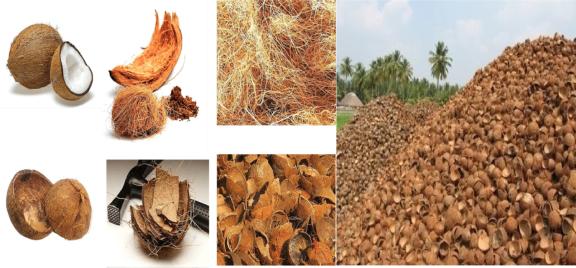
Source: ‘Coconut wastes generated after harvesting and utilization of coconut fruit,’ from A review on the sustainable energy generation from the pyrolysis of coconut biomass, Authors: Osarhiemhen Azeta et al., License: CC BY 4.0)
More than half of surveyed Europeans confirmed they ate more sustainably since the COVID-19 pandemic, according to new market research. A study by Kerry Group also showed that 51% of consumers in foodservice said they were happy to pay more for sustainable options.
An estimated 95% of coconuts produced globally is harvested by smallholders whose negotiation power is not strong enough to ensure their rights in the supply chain. To ensure a stable and sustainable supply of coconuts, 17 companies (including Nestle, Ferrero, TM Duché, Unilever and AAK, among others) have agreed to set up the ‘The Sustainable Coconut Partnership’ impact organisation in 2023.
Traceability in the coconut industry is a significant challenge due to the nature of supply chains. However, companies like Nestlé are working on improving traceability and farmer engagement. The use of technology, such as blockchain, is also being explored to enhance traceability in the coconut industry, as presented by the International Labour Organization at the second World Coconut Congress.
One example of companies providing sustainability support is the Franklin Baker Company of the Philippines. The company is involved in a sustainability and transparency project together with the Livelihoods Fund. In this project, smallholders sell their crop directly to Franklin Baker through farmer-owned cooperatives. In turn, Franklin Baker sells the processed coconut to one of the leading desiccated coconut users, Mars.
Ken taste, East Africa’s leading producer of coconut products, has been sourcing coconuts from organic-certified smallholder farmers to supply buyers in Europe, the United States, Africa and the Middle East. The company’s product range has grown considerably and includes desiccated coconut, coconut flour and coconut snacks. The company sources all its coconuts from over 3,200 smallholder farmers in over 63 rural villages across the Kenyan coast. 50% of these farmers are organic and fair trade certified.
Tips:
- Eco Vadis, a leading provider of business sustainability ratings, offers free videos about how to make your supply chain more sustainable.
- For more insight into key sustainability issues for coconut, consult the Sustainable Coconut Charter(PDF).
- Consider investing in sustainable certification schemes, such as Rainforest Alliance, Fairtrade, Fair for Life and Fair Trade Certified to ensure a stable production and better access to European markets.
- Subscribe to the free email newsletter of the Sustainable Coconut Partnership to keep on top of developments. Just enter your email address in the newsletter subscription box that is located at the bottom of their home page.
Autentika Global carried out this study on behalf of CBI.
Please review our market information disclaimer.
Search
Enter search terms to find market research